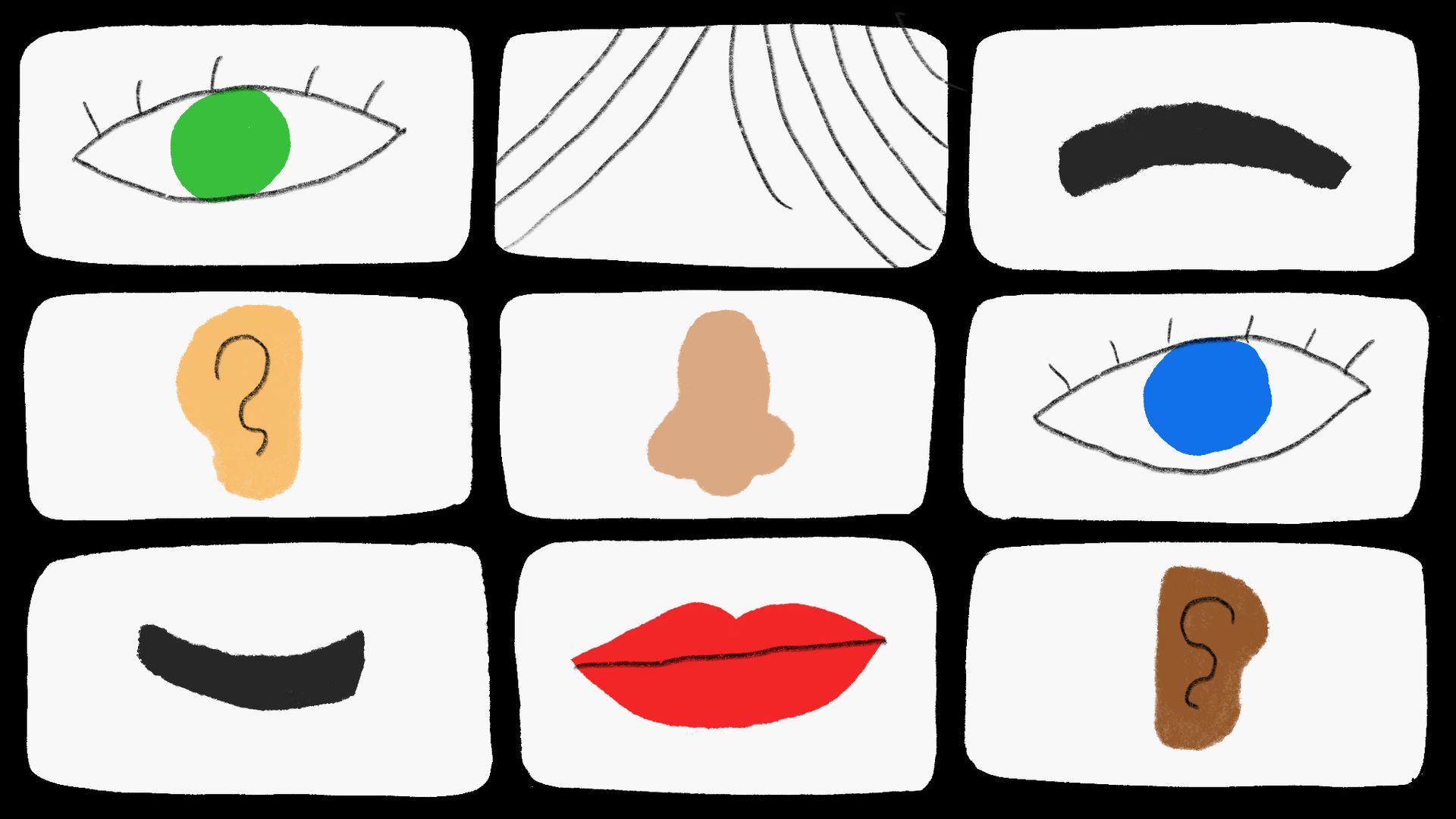尊敬的用户您好,这是来自FT中文网的温馨提示:如您对更多FT中文网的内容感兴趣,请在苹果应用商店或谷歌应用市场搜索“FT中文网”,下载FT中文网的官方应用。

If you still find it hard not to stare at yourself when you’re on a video call, then you are not alone. Nor should you worry that this betrays a distressing level of narcissism. The author Nancy Mitford once observed that people who look at themselves in every reflection often do so not from vanity but a feeling that all is not quite as it should be. Video calls, which subtly distort our faces, are the perfect demonstration.
如果你在视频通话时仍然发现自己无法不盯着自己看,那么你并不孤单。你也不必担心这暗示了一种令人不安的自恋程度。作家南希•米特福德(Nancy Mitford)曾经观察到,那些在每个反射中都盯着自己看的人,往往并非出于虚荣,而是因为有种感觉,即事情并不完全如预期。视频通话微妙地扭曲了我们的面容,这就是最好的证明。
The speed with which we have folded video meetings into our lives is remarkable. In 2019, California video conferencing company Zoom had 10mn daily users. It now has about 300mn. Rapid uptake has resulted in new etiquette — the smile and silent wave that marks the end of a call, for example. But the level of self-surveillance that is required remains strange. This is why companies such as Microsoft, Google and Zoom have been quietly changing your appearance.
我们将视频会议融入生活的速度之快令人惊叹。2019年,加利福尼亚的视频会议公司Zoom的日均用户数量为1000万。现在,这个数字已经增长到约3亿。快速的普及带来了新的礼仪——例如,微笑和无声的挥手标志着通话的结束。然而,所需的自我监控程度仍然让人感到不寻常。这就是为什么微软(Microsoft)、谷歌(Google)和Zoom等公司一直在悄悄地改变你的外观。
Last year, Microsoft introduced an eye-catching feature that allowed videocall users to pick from 12 digital make-up “looks”. The effects, created in tandem with cosmetics brand Maybelline, make cheeks appear rosier and eyes brighter. There is always the risk that a slow internet connection will produce a lag — move fast and your lipliner may not move with you — but it is a remedy to feeling drab in a morning meeting.
去年,微软推出了一项引人注目的功能,允许视频通话用户从12种数字化妆容中进行选择。这些效果是与化妆品品牌美宝莲联手打造的,能让脸颊更红润,眼睛更明亮。然而,网络连接速度慢可能会造成延迟——如果动作过快,你的唇线可能无法跟上你的移动——但这也是一种解决早晨会议中感觉平淡无光的良方。
Adding digital make-up to something that is primarily a work tool had a mixed response from users. Why, asked one, was Microsoft fiddling about with appearances when other features were still lacking? “There’s still no way for me to create a single Teams channel meeting in the Teams Calendar app,” they wrote. “ . . . but I can put on lipstick? How is this a priority?”
对于主要作为工作工具的东西添加数字化化妆功能,用户的反应褒贬不一。有人质疑,为什么微软在其他功能尚未完善的情况下,却在外观上做文章?他们写道:“我在'Teams'日历应用中仍无法创建一个单独的'Teams'频道会议……但我可以涂口红?这怎么成为优先事项了?”
In fact, how people look online is a priority for tech companies such as Microsoft. If that is someone’s main source of unease, then fixing it will help to ensure they keep using video conferencing platforms.
实际上,如何塑造人们在网上的形象是微软等科技公司的首要任务。如果这是某人主要的不安之源,那么解决这个问题将有助于保证他们继续使用视频会议平台。
Perhaps you think you haven’t participated in this trend? If so, you’d be wrong. Not every change has been as dramatic as Microsoft’s make-up looks. Most are subtle and take place without your knowledge.
也许你认为自己并未参与到这个趋势中?如果是这样,你就错了。并非所有的变化都像微软的数字妆容那样引人注目。大部分变化都是微妙的,并且在你毫不知情的情况下发生。
Take mirror view, which means that the screen you now see in most video conferences shows the version of your face that you see in a mirror — ie the one that you are most familiar with. Looking at the other version, the one everyone else sees when they look at you, tends to be jarring. Any asymmetry seems to be the wrong way round and so stands out. It’s something that smartphone makers and selfie-focused social networking company Snap figured out a long time ago.
采用镜像视图,这意味着你在大多数视频会议中看到的屏幕显示的是你在镜子中看到的自己的脸——也就是你最熟悉的那个版本。看向另一个版本,也就是其他人看你时所看到的版本,往往会让人感到不适。任何不对称的地方似乎都是反向的,因此显得格外突出。这是智能手机制造商和以自拍为主的社交网络公司Snap很早就发现的事实。
Other tweaks include lighting effects and skin smoothing. Zoom says that it was the first to offer “touch up my appearance” filters. In 2022, Microsoft introduced a soft-focus filter. A year later, Google added what it called “portrait touch-up”.
其他调整包括灯光效果和皮肤平滑处理。Zoom声称,它是第一个提供“美化我的外观”滤镜的公司。2022年,微软推出了柔焦滤镜。一年后,谷歌增加了被称为“人像修饰”的功能。
Blame computers rather than your face for these fixes. PCs and laptops tend to have small camera lenses and record users relatively close up. That distorts appearances. Prominent parts of the face stand out more. Eyes can look smaller.
这些问题应归咎于电脑,而非你的脸部。个人电脑和笔记本电脑通常配备较小的摄像头镜头,且拍摄用户的距离相对较近,这会导致外貌扭曲。脸部突出的部分会更加显眼,眼睛可能看起来更小。
Seeing this slightly unusual, and unflattering, version of yourself may be behind the phenomenon dubbed Zoom dysmorphia, in which people fixate on the supposed flaws they see on screen. I asked a Bay Area cosmetic nurse if it was true that video meetings had led to a rise in customers seeking fillers, Botox and other invasive procedures. Not only had the numbers increased, she said, but some patients came to see her with screenshots of themselves from online meetings. This is backed up by a 2021 survey of US dermatologists who said most of their patients mentioned video calls as one of the reasons for pursuing cosmetic treatment.
看到屏幕上稍显不寻常且不讨人喜欢的自我形象,可能是被称为“Zoom失形症”的现象的背后原因,人们在这种现象中会过度关注他们在屏幕上看到的所谓的缺陷。我询问了湾区的一位美容护士,视频会议是否真的导致了寻求填充剂、肉毒杆菌和其他侵入性手术的顾客增加。她说,不仅人数增加了,而且一些患者还带着自己在在线会议中的截图来找她。这得到了2021年对美国皮肤科医生进行的一项调查的支持,调查显示,大多数患者都提到视频通话是他们寻求美容治疗的原因之一。
Of course, the simple answer is to stop looking at yourself — or turn off self-view and concentrate on everyone else. But despite the complaints about how uncomfortable it is to be confronted with your own face for hours on end, this is a relatively unpopular option. A journalist at online magazine Wired suggested that hiding your image might induce a feeling that you have “dissolved into the ether”. I think it may be more to do with a mood-lowering suspicion that you need to monitor yourself in case your face does something weird in the meeting.
当然,最简单的解决办法就是不再看自己——或者关闭自我视角,专注于其他人。但是,尽管有人抱怨连续几个小时面对自己的脸有多不舒服,这个选择相对来说并不受欢迎。在线杂志《连线》的一位记者提出,隐藏自己的形象可能会让人产生一种“消失在虚空中”的感觉。我认为这可能更多的是因为一种情绪低落的怀疑,你需要监控自己,以防你的脸在会议中做出奇怪的表情。
There is a final, rather drastic, remedy. Google’s AI model Gemini is planning a new feature called “Attend for me” in which it will turn up to a video meeting on your behalf, deliver your message and then send you a recap of the other attendees responses. It sounds fantastically impolite and the sort of feature that will lead to no one attending video meetings in person ever again. For those who dislike looking at themselves online, that would be the dream scenario.
还有一个最后的、相当激进的解决方案。谷歌的AI模型双子座(Gemini)正在计划推出一项名为“代我出席”的新功能,它将代表你出席视频会议,传达你的信息,然后向你发送其他与会者的反馈摘要。这听起来非常不礼貌,而且这种功能可能会导致人们再也不亲自参加视频会议。对于那些不喜欢在网上看自己的人来说,这将是理想的场景。